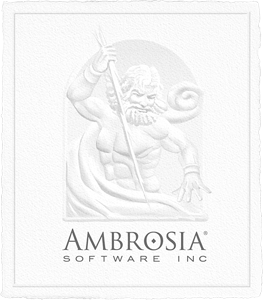Top Qs
Timeline
Chat
Perspective
Ambrosia Software
Defunct American software company From Wikipedia, the free encyclopedia
Remove ads
Ambrosia Software was a predominantly Macintosh software and gaming company founded in 1993 and located in Rochester, New York, U.S. Ambrosia Software was best known for its Macintosh remakes of older arcade games, which began with a 1992 version of Atari, Inc.'s Asteroids from 1979. The company also published utility software. Its products were distributed as shareware; demo versions could be downloaded and used for up to 30 days. Later the company released some products for iOS. Ambrosia's best-selling program was the utility Snapz Pro X,[1][2] according to a 2002 interview with company president Andrew Welch.
In 2017, customers reported on Ambrosia's Facebook page that attempts to contact the company were unsuccessful and they were unable to make new purchases.[3] As of July 2019, the website is offline. As of May 2021, the website resolves but leads to a domain parking page with ads unconnected to the company.
Remove ads
History
The first game distributed under the Ambrosia Software name was Maelstrom, a 1992 remake of the 1979 Asteroids arcade video game. It uses raster graphics similar in style to Atari's later Blasteroids (1987) and the Atari ST game Megaroids (1988).[4] Despite the concept being 13 years old at the time of release, Maelstrom was popular at a time when Macintosh action games were in short supply, and it won some software awards.[5]
Ambrosia Software was incorporated August 18, 1993, by Andrew Welch after he graduated from the Rochester Institute of Technology in 1992.[6] Maelstrom was followed by more action games, including Apeiron (a remake of Centipede), Swoop (a clone of Galaxian), and Barrack (a clone of JezzBall). In 1999, Cameron Crotty of Macworld wrote that "No other company has gotten so much mileage out of renovating mid-1980s arcade hits."[7]
Nearly all of the company's ten employees were laid off in 2013, but Welch denied rumors of the company closing.[8] In late 2018, the company's last remaining employee announced that Ambrosia was officially shutting down operations.[9]
Remove ads
Products
Summarize
Perspective
Games
Ambrosia Software's games, in order of release:
Ambrosia, in conjunction with DG Associates, has also released the Escape Velocity Nova card-driven board game.[14]
Productivity software
Ambrosia Software's utilities, in order of release:
- Eclipse — Screen saver CDEV
- Big Cheese Key — FKey to mask screen image from boss.
- FlashWrite — Text editor Desk Accessory
- FlashWrite ][
- ColorSwitch — Menu bar item to change monitor color depth
- EasyEnvelopes — Envelope printing Desk accessory. Later a Mac OS X v10.4 and Mac OS X v10.5 Dashboard widget.
- Snapz
- To Do!
- Oracle
- ColorSwitch Pro
- Snapz Pro — Screen capture application
- iSeek — Desktop search application
- Snapz Pro X — Mac OS X-compatible version of original
- WireTap Pro — Audio recording utility
- Screen Cleaner Pro — April Fool's joke
- Dragster — File transfer application
- iToner — iPhone custom ringtone transfer utility
- WireTap Studio — Audio recording, editing and master storage; won a 2007 "Eddy Award" from Macworld
- WireTap Anywhere — professional virtual audio patchbay utility, enabling the recording of any Mac OS X application's audio output from within any Mac OS X audio application.
- Soundboard — Mac OS X Audio playback ("computerized cart machine")
- Big Cheese Key X — Mac OS X-compatible version of original
Remove ads
Abandoned projects
In 1996, Ambrosia announced the development of a 3D horror-themed adventure game called Manse by Brian Barnes.[15] It was demoed at Macworld Expo in 1998.[16]
In 2014, Tod Baudais claimed to be continuing work on a cancelled Ambrosia project called Goo Moo,[17] or Gooliens, a game about a green alien blob that must grow in size in order to abduct cows.[18]
Shareware policies
One of Ambrosia's founding mantras was that shareware software should not be distributed as crippleware. The company's software was released on the honor system with only a short reminder that you had used the unregistered software for "x" amount of time, creating what is commonly called nagware.[19]
This policy was later changed and the company employed typical shareware piracy prevention measures,[20] as well as more innovative ones such as used in the Escape Velocity line of games where the team's mascot, Hector the Parrot (known in-game as Cap'n Hector), would use her heavily armed ship to ceaselessly attack players of unregistered copies after the trial period had expired. Their software products therefore began to fall under the category of crippleware.[20] Although the company no longer provides new expiring license codes, Ambrosia's founder Andrew Welch released Decoder Ring[21] which allows anyone to generate new license codes.
Matt Slot has written about the factors that played into the policy change.[19]
Remove ads
References
External links
Wikiwand - on
Seamless Wikipedia browsing. On steroids.
Remove ads

